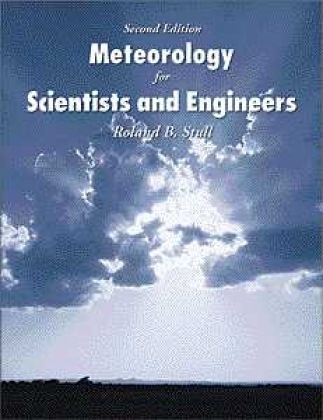
Meteorology for Scientists and Engineers
Brooks/Cole (Verlag)
978-0-534-37214-9 (ISBN)
- Keine Verlagsinformationen verfügbar
- Artikel merken
The Second Edition of Roland Stull's METEOROLOGY FOR SCIENTISTS AND ENGINEERS lets professors quantify the concepts in Ahren's METEOROLOGY TODAY, SEVENTH EDITION like never before. This book can serve as a technical companion to Ahren's text or as a stand-alone text. It provides the mathematical equations needed for a higher level of understanding of meteorology. The organization is mapped directly to the Ahrens book, making Stull's text a perfect companion. More than a lab manual or workbook, this text contains detailed math and physics that expand upon concepts presented in Ahrens' text, as well as numerous solved problems. This text demonstrates how to use mathematical equations (algebra, geometry, trigonometry, and finite differential equations) to explain the dominant characteristics of certain atmospheric phenomena and processes.
Roland Stull is Professor and Chair of Atmospheric Sciences in the Department of Earth and Ocean Sciences at the University of British Columbia (UBC), Canada, and Director of the Geophysical Disaster Computational Fluid Dynamics Center. He was a professor at the University of Wisconsin-Madison for sixteen years before moving to The University of British Columbia in 1995. His early work in boundary-layer meteorology took him to Africa, Europe, and many sites in America for airborne field experiments, while his current research on numerical weather prediction utilizes massively-parallel computer clusters. He has taught courses in 20 different topics, ranging from a survey course on natural disasters with enrollments of 1,000 students, to graduate-level courses on non-linear dynamics and chaos. In addition to METEOROLOGY FOR SCIENTISTS AND ENGINEERS, he has written an upper-level text, AN INTRODUCTION TO BOUNDARY-LAYER METEOROLOGY (Kluwer, (c)1989), which is now in its eighth printing. He is a Certified Consulting Meteorologist, as well as a Certified Flight Instructor in the United States.
1. THE ATMOSPHERE Introduction / Meteorological Conventions / Thermodynamic State / Equation of State - Ideal Gas Law / Hydrostatic Equilibrium / Hypsometric Equation / Atmospheric Structure / Process Terminology / Summary / Exercises 2. RADIATION Orbital Factors / Flux / Radiation Principles / Surface Radiation Budget / Summary / Exercises 3. HEAT Sensible and Latent Heats / Lagrangian Heat Budget - Part 1: Unsaturated / Thermodynamic Diagrams - Part 1: Dry Adiabatic Processes / Eulerian Heat Budget / Surface Heat Budget / Apparent Temperatures / Summary / Exercises 4. BOUNDARY LAYERS Static Stability - A Preview / Boundary-Layer Formation / ABL Structure and Evolution / Temperature / Wind / Turbulence / Summary / Exercises 5. MOISTURE Saturation Vapor Pressure / Humidity Variables / Total Water Mixing Ratio / Lagrangian Water Budget / Thermo Diagrams - Part 2: Isohumes / Eulerian Water Budget / Lagrangian Heat Budget - Part 2: Saturated / Thermo Diagrams - Part 3: Saturated Adiabats / Summary / Exercises 6. STABILITY Thermodynamic Diagrams - Part 4: Applications / Parcels vs. Environment / Buoyancy / Static Stability / Thermo Diagrams for Boundary Layers / Brunt-Vaisala Frequency / Dynamic Stability / Summary / Exercises 7. CLOUD FORMATION Cloud Development / Cloud Sizes / Fractal Cloud Shapes / Processes Causing Saturation / Clouds and Upslope Fog / Other Fogs / Summary / Exercises 8. PRECIPITATION Nucleation of Liquid Droplets / Nucleation of Ice Crystals / Droplet Growth by Diffusion / Ice Growth by Diffusion / Collision and Collection / Precipitable Water / Rainfall Estimated by Radar / Summary / Exercises 9. DYNAMICS Newton"s Second Law of Motion / Forces / Full Equations of Motion / Height Contours on Isobaric Surfaces / Winds / Full Equations of Motion - Revisited / Mass Conservation / Summary / Exercises 10. LOCAL WINDS Scales of Motion / Wind-Speed Probability / Wind Turbines and Power Generation / Vertical Equation of Motion / Thermally Driven Circulations / Streamlines, Streaklines, and Trajectories / Bernoulli"s Equation / Mountain Waves / Foehns (again) and Chinooks / Summary / Exercises 11. GLOBAL CIRCULATION Nomenclature / Differential Heating / Thermal Wind Relationship / Jet Stream / Vorticity / Midlatitude Troughs and Ridges / Focus: Rossby Radius of Deformation and Geostrophic Adjustment - Part 1 / Three-Band General Circulation / Ekman Spiral in the Ocean / Summary / Exercises 12. AIR MASSES & FRONTS Anticyclones or Highs / Air Masses / Synoptic Weather Maps / Surface Fronts / Geostrophic Adjustment - Part 2 / Frontogenesis / Occluded Fronts and Mid-Tropospheric Fronts / Dry Lines / Summary / Exercises 13. CYCLONES Case Study of a Cyclone over North America / Cyclogenesis / Lee Cyclogenesis / Cyclone Spin-Up / Upward Motion / Sea-level Pressure Tendency / Self Development of Cyclones / Iso-surfaces and Their Utility / Case Study of a Cyclone (Continued) / Summary / Exercises 14. NUMERICAL WEATHER PREDICTION Solutions to Atmospheric Equations / Grid Points / Finite-Difference Equations / Numerical Stability / The Numerical-Forecast Process / Forecast Quality / Nonlinear Dynamics and Chaos / Useful Indicators on Weather Maps Produced By NWP / Elements of a Good Weather Briefing / Summary / Exercises 15. THUNDERSTORMS Convective Conditions / CAPE / Severe-Thunderstorm Environment / Downbursts and Gust Fronts / Lightning and Thunder / Tornadoes / Doppler Radar / Summary / Exercises 16. HURRICANES Dynamics / Thermodynamics / A Hurricane Model / Storm Surge / Surface Wind-Waves / Summary / Exercises 17. AIR POLLUTION DISPERSION Dispersion Factors / Air Quality Standards / Turbulence Statistics / Dispersion Statistics / Taylor"s Statistical Theory / Dispersion in Neutral & Stable Boundary Layers / Dispersion in Unstable Boundary Layers / Summary / Exercises 18. CLIMATE CHANGE Relative Equilibrium / Greenhouse Effect / Atmospheric Window / Water Vapor and Cloud Feedbacks / Ice-Albedo-Temperature Feedback / Daisyworld / GCMs / Sensitivity / Summary / Exercises 19. OPTICS Ray Geometry / Liquid Drop Optics / Ice-Crystal Optics / Scattering / Diffraction / Mirages / Summary / Exercises / APPENDIX A: FUNDAMENTALS OF SCIENCE / Dimensions and Units / Functions and Finite Difference / Relationships and Graphs / On Doing Science / Summary / Exercises / APPENDIX B: CONSTANTS AND CONVERSION FACTORS / Universal Constants / Earth Characteristics / Air and Water Characteristics / Conversion Factors & Combined Parameters / Other Information / APPENDIX C: NOTATION / Roman Symbols, Acronyms & Contractions / Greek Symbols / Operators / Superscripts / Subscripts / Special Symbols / APPENDIX D: ADDITIONAL READING MATERIAL / The Atmosphere / Radiation, Thermodynamics & Moisture / Cloud & Satellite Pictures / Cloud & Storm Processes / Dynamics of Atmospheres & Oceans / Boundary-Layers & Air Pollution / Synoptics / Numerical Weather Prediction & Chaos / Hurricanes / Climate Change / Optics / APPENDIX E: ANSWERS TO SELECTED EXERCISES / Answers for Chapters 1 to 6 / Answers for Chapters 6 to 13 / Answers for Chapters 13 to 19 / Answers for Appendices A & H / APPENDIX F: SYLLABUS / The Student Mix / Tests & Grading / Textbooks & Homework / Lectures & Weekly Schedule / APPENDIX G: CHAPTER CORRESPONDENCES / Ahrens" Essentials / Ahrens" Meteorology Today / Holton"s Dynamic Meteorology / Wallace and Hobbs" Atmospheric Science / APPENDIX H: TURBULENCE CLOSURE / Turbulence Closure Types / K-Theory / Transilient Turbulence Theory / Summary / Exercises / INDEX
| Erscheint lt. Verlag | 29.1.2000 |
|---|---|
| Zusatzinfo | index |
| Verlagsort | CA |
| Sprache | englisch |
| Maße | 216 x 276 mm |
| Gewicht | 1240 g |
| Themenwelt | Mathematik / Informatik ► Mathematik ► Angewandte Mathematik |
| Naturwissenschaften ► Geowissenschaften ► Allgemeines / Lexika | |
| Naturwissenschaften ► Geowissenschaften ► Meteorologie / Klimatologie | |
| ISBN-10 | 0-534-37214-7 / 0534372147 |
| ISBN-13 | 978-0-534-37214-9 / 9780534372149 |
| Zustand | Neuware |
| Informationen gemäß Produktsicherheitsverordnung (GPSR) | |
| Haben Sie eine Frage zum Produkt? |
aus dem Bereich


